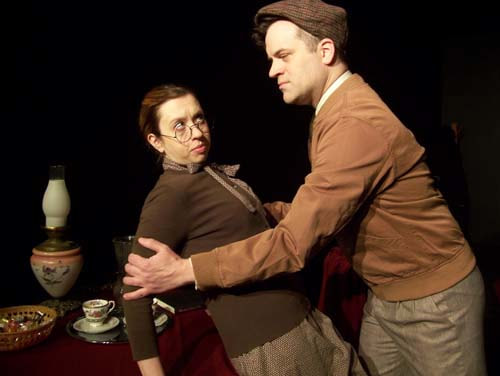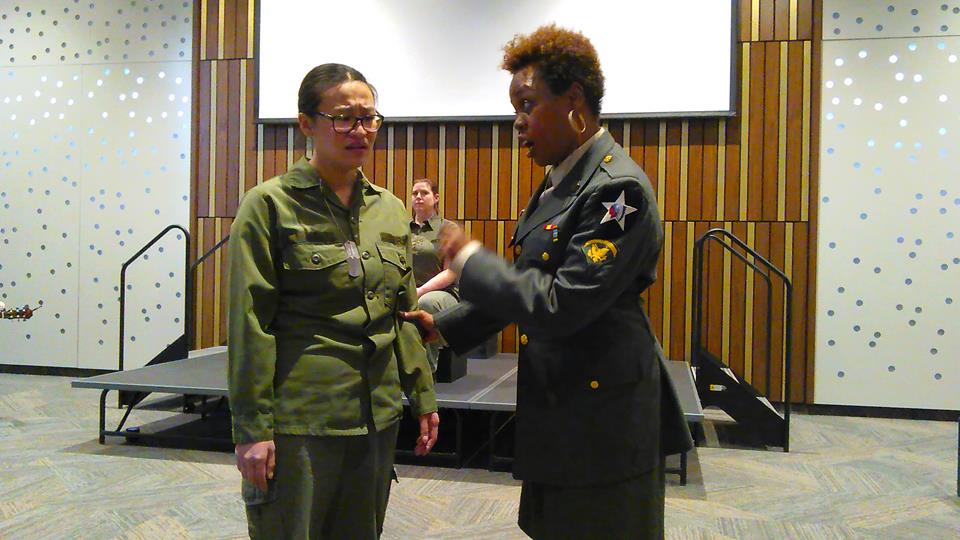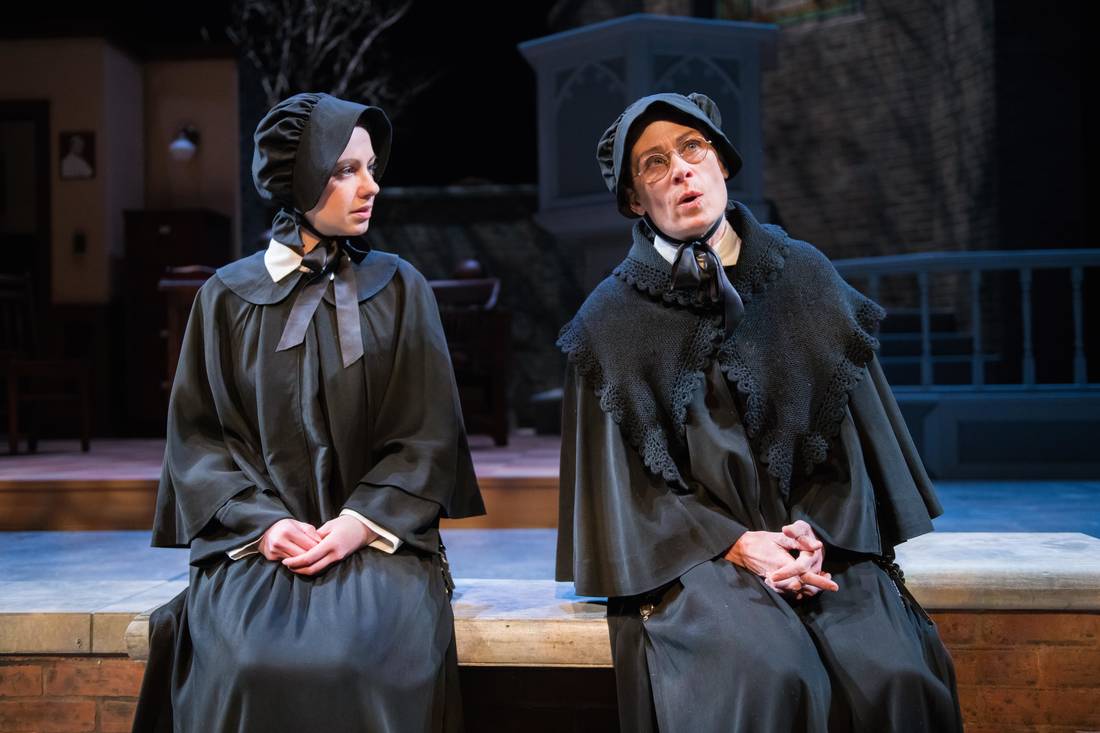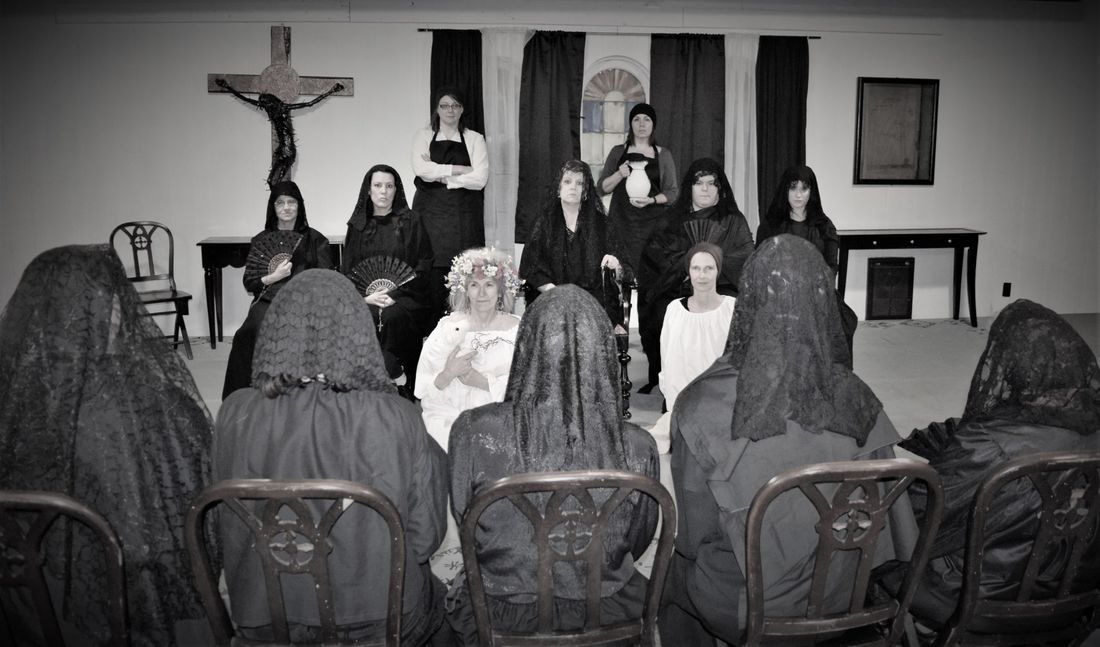|
Off the Wall Theatre’s tiny space plays host to a moody drama as it presents Night Must Fall. The play is set in a remote home in Essex in the early 20th century. Donna Lobacz is admirably stern as Mrs. Bramson--a bitter, old wheelchair-bound woman of wealth around which the shadowy action of the thriller orbits. Jenny Kosek is subtly fascinating as Mrs. Bramson’s niece Olivia. As the drama opens, Kosek cleverly delivers Olivia’s disgust of Mrs. Bramson in shiftings and emotionality that serves to set the stage for the rest of the drama. The Ensemble Mrs. Bramson is surrounded by people who have been pulled into her proximity. Gladys Chmiel is charming as Bramson’s longtime cook. Caitlin Kujawski Compton plays delicate and fragile in spite of a potentially imposing stage presence in the role of the maid Dora. Mark Neufang smartly finds great complexity in the character of her former lover Dan, who ingratiates himself with Mrs. Bramson. There’s a lot of emotion in and around the ensemble that finds counterpoint in a powerfully subdued Jeremy Welter as a painfully mild-mannered man looking to wed Olivia. Those familiar with Welter’s dynamic strengths onstage may find it odd. He’s just so...boldly flaccid and inert, which makes the role work beautifully and lends a really important sort of...lower register to the drama to keep it all grounded properly. The Conflict Once things have settled-down in establishing relations between an ensemble at Mrs. Bramson’s estate, a heroically sinister James Strange shows-up in the role of a police inspector who has come to investigate the disappearance of a woman in the area. Playwright Emilyn Williams spends much of the rest of the thriller allowing characters to interact with and suspect each other of kidnapping or murder. It’s a script that makes for a rather tight two hours in a small theatre. At the center of the drama is a mysterious chemistry between Kosek and Neufang as Olivia and Dan. There’s a lot between the two of them that is totally unspoken and largely ineffable. Silences and glances come across almost...symphonically between the two of them as their conflict pushes the story through much of the time between the beginning and end of the drama. At times the drama seems ridiculously amplified...but with Kosek and Neufang there’s a balance which allows the overblown intensity to work in such a small space. Light, Sound and Mood Aiding matters considerably are lighting and sound design. Director Dale Gutzman and Technical Director David Roper splash lights in strange spaces across the weirdly cluttered landscape of the home. Jake Russell has provided just enough of a musical soundscape to slightly amplify the mood and allow the emotional reality of the drama a somewhat stylishly cozy place in which to reside. The...Physical Heat I was given the option of a couple of different places to sit...and might have made the mistake of sitting in the front row. Typically I love getting as close as possible to a studio drama, but...once again I seemed to have forgotten just how hot it gets at the Off the Wall...particularly in months when it’s also warmer outside. The heat from the theatre AND the heat of the lights brings things over to the toasty side of uncomfortable, but that lack of physical comfort can ratchet-up the emotional discomfort of a compellingly moody drama for late April and early May. Enter the theatre and Kosek is huddled in character amidst shadows waiting for everything to start again. It’s quite a journey. Off the Wall Theatre’s production of Night Must Fall runs through May 6 at Off the Wall’s space on 127 East Wells St. For ticket reservations, call 414-484-8874 or visit Off the Wall online.
1 Comment
This month Cooperative Performance presents the war drama A Piece of My Heart. The Vietnam War is seen through the eyes of the women who served. It’s a compelling look at war from a perspective that doesn’t often get seen. So often war dramas have women serving around the edges of the action. A Piece of My Heart flips this. It’s quite refreshing to see a war drama with a token male. Just one guy in a cast of women in a story that covers one hell of a lot of ground in two hours with one intermission. A Diverse Ensemble The scope of the drama is surprisingly wide. The play opens with enlistment and volunteers signing-up to serve in various different ways. Then there’s training, active combat and recreation. We get the end of a tour of duty right before intermission and then...all of the horrors back home after war on the other side of it. It’s a really wide view of the war which manages to feel big and ominous. The impressive thing about this: There are only seven people in the cast and it's a very small performance space. Tina Nixon is aggressively poised as a career military intelligence officer named Steele. Nixon has a stern strength about her presence which serves as a sturdy backbone for the ensemble. Her formidable energy in the role amplifies her frustration in dealing with the top brass. Anna Figlesthaler and Nicole Martin play to the heartbreakingly exhausting life of medical support in a war zone. Figlesthaler plays the daughter of a nurse who served in World War II who volunteers for duty in Vietnam and gets more than she’d expected. The depth of Martin’s performance settles-in after intermission when dealing with tragedy at home after the war. Sheng Lor is given the challenge of one of the most emotionally textured character arcs. At the opening of the drama she signs-up to serve in Hawaii, but gets drawn into Vietnam, where she experiences love, loss and deeper concerns of socio-cultural identity. Lor puts in an amazing performance. Don’t ever recall seeing her before. Hopefully she gets cast in more shows. Emmaline Friederichs plays a woman from a wealthy family who goes out to serve in the Red Cross. Life in a war quickly toughens her at a price. During service she’s mercilessly precise. In the off-hours, she’s caving-in emotionally. Friederichs carves out quite a dichotomy between the two sides of the character. In addition to the military and the Red Cross, we get the USO. Ashley Retzlaff plays a country music singer who extensively tours Vietnam. In addition to adding music that sets the mood via acoustic guitar, Retzlaff brings life to a side of the war that adds quite a bit of depth to the drama. Josh Decker plays ,“The Men.” All of them. There are quite a lot of them in and around the edges of the drama. To his credit, Decker never exaggerates the difference between different characters. He’s able to play a number of different roles without over-rendering each of them in a way that would distract from the women at the center of the drama. Sweeping War Drama in a Studio The nation of Vietnam is 127,881 mi². The performance space at the War Memorial is...much smaller than this. Director Abigail Stein has fostered a tempo and intensity that makes the small space feel kind of immense at times. There’s no set and few props. Sound Designer Loren M. Watson’s audio backdrop for the show is minimalist. Stein allows the drama of an intimate space to be about the people caught-up in the drama. Aside from a few images projected in the background and a few sound effects here and there, the strength of A Piece of My Heart largely rests in the energy of the cast, which is well-modulated from beginning to end. Of particular note here is the flurry of activity that we feel in combat as medics get to work. Nixon is the fiery gravity at the center of a storm as Figlesthaler. Martin and Lor rush around amidst the pristine poise of Friederichs tirelessly keeping it all together. At moments like that, the ensemble pleasantly overwhelms. The Space The Milwaukee County War Memorial Center is the perfect venue for a show about war. A Piece of My Heart is a rare opportunity to see an intimate show in a beautiful space. It’s not often a small-stage show makes it to a piece of architecture that’s as striking as this. The entire space seems to be a tribute to straight lines, right angles an wide, flat expanses. The mid-1950s work by Eero Saarinen seems strange coming from an architect who would go on to design the tulip chair and the Gateway Arch. No subtly elegant simple curves here. Evidently Eero was feeling Brutalism in a very big way when considering the design of a memorial for those who served in the military. Very few curves in the wide, flat space one walks though on the way in to see a show about war. The walk out after the show is pretty breathtaking as well. Emerge from the war drama in the Memorial and there’s the ever-expanding Milwaukee skyline seen from a rather unique perspective. From beginning to end, A Piece of My Heart is remarkably intense. Cooperative Performance’s production of A Piece of My Heart runs through Apr. 29 at the Milwaukee County War Memorial Center on 750 N. Lincoln Memorial Drive. For ticket reservations and more, visit Cooperative Performance online. John Patrick Shanley’s Doubt is frighteningly simple in its complexity. With four characters, Shanley dissects a basic question of truth with the kind of emotional precision that reveals the deeper inner complexity of human reality. Milwaukee Chamber Theatre stages a thoroughly satisfying production of the drama this month from the stage of the Broadway Theatre Center. It’s a Big Place. Lots of Space It’s hard to miss the immensity of the set. We’re looking at a huge church meant to represent...in a way...all of Catholicism. The Broadway Theatre Center’s Cabot Theatre is big and spacious without feeling overwhelming the way the larger venues in town do. Scenic Designer Steve Barnes manages to make it look positively immense, though. Huge stretches of empty space are contrasted against massive, ominous stretches of brick which seem to encompass everything. There’s a massive stained glass in the background. There’s a delicate calculus at work between the cast, the set and all that empty space. It’s difficult to define quite why it works, but director C. Michael Wright has managed to find a way to make the drama of a few people seem every bit as big and powerful as the church itself. The right kind of blocking goes a long way here, but there’s something more at work and it has to do with the dynamic of the ensemble. Father Brendan Flynn: Balanced Mystery The Eastern New England accent is a really, really difficult one to nail down. Len too heavily on it and it sounds like you’re doing a weak impersonation of JFK. Lean too faraway from it and it sounds totally indistinct. Dialect Coach Raeleen McMillion and Marcus Truschinski have found the perfect voice for Father Brendan Flynn: a man of authority who is suspected of inappropriate relations with a young boy. There’s a mystery about the character from the moment we see him onstage. Truschinski cleverly delivers the casual day-to-day mystery of Father Flynn. There’s never anything overtly sinister in his interactions. Truschinski allows the events of the drama to define the mystery within the character rather than attempting to over-render the warmth of his kindness or the coldness of his authority. The first time I saw Doubt, it was with the Rep just over ten years ago. Brian Vaughn played Father Flynn with a nice-guy charisma that was strong enough to wash away much of the mystery. To see Vaughn in the role, you’d just sort of...assume that Flynn didn’t do anything wrong. With Truschinski, there’s a delicate balance in the background of the character that keeps his true nature a truly fascinating mystery. The Nuns in the Shadows Colleen Madden and April Paul play Sister Aloysius Beauvier and Sister James-a couple of nuns at the church who suspect Father Flynn of impropriety. Reference to the progression of authority in the Catholic church throughout the play. The chain of authority seems to permeate every breath and heartbeat of the drama. Sister James is a young nun who answers to Sister Aloysius who serves the church far below Father Flynn. None of the three perfectly follow this authority, however. They respect it, but they don’t perfectly conform to it. Each of the three has a different reason for feeling uncomfortable with it, but they must all respect that it’s there. You could imagine this would be a really, really difficult dynamic to bring across onstage given only 90 minutes’ time. C. Michael Wright and company do an excellent job of bringing the specifics of this complexity to the stage in an approach which seems to start with the nuns. Madden and Paul tread delicately around each other as two different people with two different levels of authority. Madden is sternly courageous as an elder educator determined to prove Flynn’s guilt. As Sister James, April Paul wields a heroic sense of compassion as the younger nun who has a passion for teaching. Both act with the best of intentions. Each acts on these intentions in her own way. The contrast between them draws them together in a search for the truth about what happened between Father Flynn and one of the choirboys. The Mother Malkia Stampley rounds out the cast in a brief but powerful appearance as Mrs. Muller--the mother of the boy Father Flynn is suspected of having been involved in inappropriate relations with. Sister Aloysius invites her in to the office to question her about her son. Things get complicated. Mrs. Muller is a very strong African American woman dealing with life as a marginalized US citizen. (The drama is set in Autumn of 1964 just a few months after the Civil Rights Act of 1964 was enacted. The ink was still dry. There was a lot of work to be done there still is...) Stampley makes quite an impression. She doesn’t hold much authority, but she is able to respectfully challenge the notions of a very established nun in one of the drama’s most powerful scenes. Milwaukee Chamber Theatre’s production of Doubt runs though Apr. 29 at the Broadway Theatre Center. For ticket reservations, call 414-291-7800 or visit Milwaukee Chamber online. .
Churchill Drama Returns to the Studio Theatre Caryl Churchill’s Far Away is probably my favorite contemporary drama. Years ago I saw a production of it onstage at the Broadway Theatre Center’s Studio Theatre. Naturally I’m going to jump at the chance to see anything written by her. This month, Renaissance Theaterworks stages Churchill’s 1982 comic drama Top Girls. It’s being staged in the same space I saw Far Away all those years ago. Cassandra Bissell plays an executive Londoner working for an employment agency. Having just been promoted, she celebrates with a dinner party featuring successful, largely forgotten characters from throughout history. After the party, we see her at the office and learn a bit about her past in a story that explores the psyche of an upwardly mobile woman in Thatcher’s England. A Dream Cast Directed by Fete Churchill’s all-woman cast allows for a wide range of actresses. Directed by Susan Fete, the cast of the Renaissance production features some of the best actresses from nearly every contemporary generation of Milwaukee theatre. Many of them are present in the opening dinner party. Jenny Wanasek is elegantly charming as the nineteenth-century English explorer Isabella Bird. Mary MacDonald Kerr commands a strikingly casual sense of authority as the a fictitious ninth-century female pope. Rachel Zientek is boldly silent as a a gruff Flemish folk hero named Dull Gret. Grace DeWolff is calmly radiant as Patient Griselda, who shows-up a bit late to the party. (This is probably the biggest departure for any of the established Milwaukee actresses in the play. I don’t ever recall seeing DeWolff play Calmly Radiant before. It’s an energy she handles as deftly as the more active dynamic she always wields so well.) In addition to this there’s the welcome addition of Chicago-based actress Karissa Murrell Myers in the role of 13th century Japanese concubine Lady Nijō. The dinner party casually rolls along in a gorgeously luminescent set by designer Stephen Hudson-Mairet. It’s a deeply-engaging intro. The conversation gradually meanders into the matter of motherhood, which nearly everyone at the party has experienced in a distinctly different way. This sets-up the focus of the drama’s four remaining scenes. The Other Four Scenes The strangely fantastic dinner party fades-out in favor of a very earthbound quartet of scenes which focus on a couple of different characters. Cassandra Bissell is Marlene--the incredibly together upwardly mobile Londoner who works for Top Girls Employment Agency. Her story is paired against that of a fearless, young girl named Angie, played with great childlike exuberance by Elyse Edelman. We first see her in the play’s third scene in a back yard blanket fort hanging out with a friend played by DeWolff. The progression from a dinner party in the first scene to an employment agency in the second scene to a couple of girls hanging out in a backyard feels a bit disjointed at first. Edelman and DeWolff are delivering a really interesting interaction between two girls, but it’s hard to settle-into a complex connection between yet another set of characters at the end of the first act. The overall flow of action in the opening act feels off, but each scene is solidly realized. Things are a bit more focussed on the other side of intermission. Angie has come to visit Marlene at the office. She has come unannounced to witness Marlene on the job. The final scene takes place earlier. Marlene has come to visit her sister (played with a very organic energy by Libby Amato. This is the second time I can remember seeing Amato play a relatively young mother. She’s really, really good with the vaguely fatigued momentum of someone dealing with both work and parenthood. There’s a casually stylish grace and charm with Amato that anyone would love in a mother.) Insight: It’s A Mix Churchill is covering socio-political issues of being a woman and being successful that have been so thoroughly examined in so many different contemporary stories that it’s difficult for me to remember whether or not any of it would have even been terribly revelatory even when it debuted in 1981. I saw the play with my successful wife and she felt like she was cringing through a bit of what she has dealt with throughout her career in the financial services industry. This isn't anything new. She's seen it before. She doesn't need to see it here. Churchill’s coverage of a spectrum of different issues in the play seems to range from the painfully obvious to the deeply insightful. Where it's insightful, it's great. Where it's not, Churchill's script drags a bit. Throughout it all, though, there's this amazing cast that breathes such satisfying life into even the dullest moments of the drama. Renaissance Theaterworks’ production of Top Girls runs through Apr. 29 at the Broadway Theatre Center’s Studio Theatre on 158 N. Broadway. For ticket reservations, visit Renaissance Theaterworks online. Everything Means Something Else. Lauren Gunderson’s I And You is a fiercely clever, little 90 minutes in a theatre seat. Two people have a conversation. It isn’t just any casual conversation, though. You can’t do casual conversation onstage. For one thing it’d be rude. People pay good money to watch the conversation. But also: you can’t have a casual conversation onstage because everyone is watching. You have to prepare. And if that preparation happens to include this particular script by Lauren Gundrerson, every last sentence is going to have some kind of double or triple meaning. And if it happens to be directed by David Cecsarini, the depth of multiple levels of meaning are going to appealingly drift across the stage in a very organic fashion thanks to the talents of talented actors Christina Panfilio as Caroline and Ibraheem Farmer as Anthony. It’s only 90 minutes or so without intermission, but there’s A LOT to think about here. Very clever stuff. It’s a Messy Bedroom Earlier this season, we got to see Jason Fassl decorate a young woman’s bedroom in Renaissance Theaterworks’ production of Russian Transit. With I And You, Rick Rasmussen comes-up with the precise look for the bedroom of contemporary shut-in high school student Caroline. There are pictures cluttering the walls including a little shrine to retro-pop king Elvis and quite a lot of her photography. I heard someone in the audience mentioning that it looked as though the entire set could be folded-up into a little box and carried offstage at a moment’s notice. That’s no accident. This is the entire world for one high school senior. Rasmussen does a brilliant job of making it look big without losing track of the fact that it’s a very small space in which Caroline is forced to live. It’s more than just a place where the smoke detector seems to constantly be going-off and the cell reception suddenly seems to have disappeared: it’s the only place where Caroline can live. When Adults Play Teenagers About a decade and a half ago I had the pleasure of doing a phone interview with film director Catherine Hardwicke. During this interview, Hardwicke had inadvertently convinced me that the only way to do serious drama about teenagers was by having the teenagers PLAYED by teenagers. (Her indie movie Thirteen had Nikki Reed and Evan Rachel Wood playing 13 year olds while they were in their mid-teens.) Granted, it IS difficult to get high school actors on a professional show like this. There are child labor laws and things of that nature...not to mention the pressure a show like this would have on a couple of teenagers as they are the only ones in the cast..but...we DO have First Stage here in Milwaukee...and it’s one of the best children’s theatre programs in like...the world. So there’s a part of me that feels like it’s almost disrespectful to try to stage a teenaged drama without using actual teenagers...but here it wasn’t an issue at all. With Next Act's staging of I And You I know I’m watching adults play a couple of high school seniors and...I’m okay with it. I’ve been thinking about it a lot and I honestly don’t know exactly what makes actors Cristina Panfilio and Ibraheem Farmer so convincingly adolescent. I don’t know exactly what director David Cecsarini did to make it work but...it works. It doesn’t hurt that the only two characters in the play are both teenagers. This is their world and the stage has brought it to us, so there’s no contrast between adults and teenagers to muddle things-up. It doesn’t hurt that both Panfilio and Ibraheem have done a really good job of rendering the specific graces and awkwardnesses of late adolescence with a very close attention to detail and a great respect for early adulthood. They’re not playing down to the roles or exaggerating awkwardness. This is just a couple of people. It also doesn’t hurt that Lauren Gunderson’s dialogue feels very authentically millennial teen. And it doesn’t hurt that Caroline is actually a really appealing character. Caroline In Caroline, Gunderson has created the type of high school senior you would’ve wanted to hang out with or date. She’s sharp. She’s witty. She’s unobtainable on account of some really misfortunate health. So there’s that darkness that’s so appealing in high school. Okay...so yes: I would have had a HUGE crush on Caroline in high school, but there’s real wit in her dialogue and Panfilio does a brilliant job of delivering very, very clever on-liners that are clever, playful and sharply tactical. Panfilio’s graceful approach to the character makes Caroline one of the more vivid characters I’ve seen in recent years. It’s not real often that I want to hang out with a character after the end of a performance. At the end of this show I want the character of Caroline babysitting my kids. (She’s just that cool.) Turtle It’s nice to see Cloud b Twilight Turtle® getting some work here. Over the years, the luminous, little plushy and his cohorts have been more accustomed to performing light shows on the ceilings of much smaller audiences of much smaller people while making “fear of the dark a thing of the past.” Here Twilight Turtle® plays Turtle...Caroline’s symbolic little, plush friend. Nice to see the plush turtle branching out and doing a little work onstage. Next Act Theatre’s production of I And You runs through Apr. 29 on 255 S. Water St. For ticket requests and more visit nextact.org or call 414-278-0765. My concise review of the show runs in the next print edition of The Shepherd-Express. There are places where The House of Bernarda Alba is popular enough to be produced every single year. Milwaukee is not one of those places. In over a decade of covering theatre here and over 1,000 plays, I haven’t seen Alba once. I finally had a chance to see Federico García Lorca’s classic drama last night courtesy of a production being staged this month by The Village Playhouse. Erico Ortiz directs the show. He’s personally translated the script from the original Spanish. It’s clearly been a labor of love for the director who brings together an impressively large cast for an intimate, little staging of a complex family drama set in Spain just prior to the Spanish Civil War. It’s the mid-1930s and women are given a small corner of the world to inhabit. Lorca’s classic focusses-in on those women who resided in open shadows in the margins of an era preceding the rule of the dictator Francisco Franco. Anne Gorski leads an all-woman cast as the matriarch Bernarda Alba. She is the head of a rather large and relatively wealthy household in the country. Gorski summons the gravity of a conservative authority about her. Gorski’s intensity is not quite the oppressive presence of a tyrant. Gorski is not without her power in the role, but as the drama unfolds, it becomes clear that Alba herself is losing her grip. Mary Lynn Ferwerda carries an almost whimsical sense of authority about her as Bernarda’s longtime maid La Poncia. She’s able to summon much of the familiarity between herself and LaPoncia and the ever-aloof Alba. Ferwerda has charm ans wisdom that lends considerable weight to Gorski’s performance. The drama begins with a funeral and ends with a death. In the 2.5 hours (0r s0) between these two events, we are immersed in the politics of a group of people who aren’t allowed much freedom. It’s a different prison for each and every one of the characters onstage. Servants can scarcely rest. Non-servants can scarcely do anything but rest...restlessly. The intimacy of the studio theatre stage amplifies the deliciously restless feeling of the drama. There’s a definite hierarchy rigidly defined in the confines of the household from servants to those they serve. There’s a stratification of age and stature in and within the family that can be a bit difficult to follow. There’s a rigidly-defined spectrum of ages in the cast of characters in the script that isn’t perfectly mirrored in the cast onstage. This isn’t as much of a problem as it might seem at the beginning of the first act. When the restlessness settles-in the drama between characters mix and the hierarchy ultimately falls to an engrossing interpersonal drama. They’re all prisoners here. Age and status fade into the background for a group of people who are forced to share a very small space together. Though men are completely absent from the cast, their hold on the power is ever-present. There is a handsome, young man who never appears onstage who becomes a matter of contention between some of the sisters. Everyone wants out of the house and he might be a really nice way out for one of them. Bividiana Murguia beautifully plays to the center of this conflict as the youngest daughter Adela in subtle shades that can become casually explosive. His allegiances and affections become a central struggle between nearly everyone in the cast in some way as the drama rushes from funeral to death in three solidly engrossing acts punctuated by a couple of intermissions. It would doubtlessly be difficult to get an all-latin cast for a show in Milwaukee with a cast of this size. As things settle-in over the course of the drama, the specifics of the Spanish setting fade into the background and ethnicity becomes as minor a detail as age in an interpersonal drama that works very well at its heart. That being said, it’s really, really nice to see a couple of Puerto Rican actresses in the cast. Sandra Hollander has a sparklingly earthbound charisma as a central servant for the household. Miriam Kopec is fairly haunting in and around the edges as the 27-year-old daughter Amelia. Kopec has a very magnetic presence onstage even in idle moments. It would be great to see her appear in more. The distinct Latin accents of Kopec and Hollander might not be absolutely necessary for the heart of the drama, but they’re refreshingly distinctive. Theatre audiences in Milwaukee so rarely get to hear that specific Latin voice. We need more of that voice. The Village Playhouse’s production of The House of Bernardo Alba runs through April 22nd at Inspiration Studios on 1500 S. 73rd St. in West Allis. For ticket reservations, visit Brown Paper Tickets online. The Alchemist Theatre returns to classic David Mamet this month as it presents Sexual Perversity in Chicago. Making her directorial debut, the Alchemist’s Erica Case assembles a really tight, little production of the comedy set in Chicago in the mid-1970s. The story involves two men and two women living in Chicago. Their lives are seen in brief glimpses that punch their way across the stage for just over one hour without intermission. The Women Brittany Boeche plays the single most articulate character in the cast--a kindergarten teacher named Joan. There are one or two moments in the play where she expresses some really deep philosophical ideas. They’re mixed-in with quite a lot of intellectual pride that bristle against some of the other characters. Boeche finds a whimsical center to the character that keeps her from coming across as being too aloof. Joan can come across as more than a bit smug and superior, but Boeche finds a way to make it seem appealing anyway. Joan might not be the nicest person, but Boeche has a swimmingly graceful charisma that finds a slightly wild smile that emotionally warms the character’s chillier moments. Becky Cofta is given the challenge of playing the least verbal character in the story. She’s an aspiring artist named Deborah. We get the feeling that she’s probably much more expressive in her art than she is with words. Far from being completely silent, she’s got her fair share of dialogue, but Cofta’s best moments with the character lie in rendering the character’s physicality. Without a hint of exaggeration we see Deborah fall in and out of love. Very little of her dialogue speaks to exactly what she’s feeling, which allows Cofta a lot of room to render the character free from the often frustrating constraints of Mamet’s dialogue. The Guys David Sapiro is suitably unseemly as a vintage mid-’70s disco douchebag named Bernie Litko. To me, Bernie’s dialogue seems to call for more of a neanderthal/Cro-Magnon-looking blue collar alpha lounge lizard-type. Sapiro’s thin, wiry form brings a distinctly weaselly element to the character that serves the production well. Sapiro has no problem delivering Bernie’s misogyny to the stage in cleverly oblivious comic form, but Sapiro’s real accomplishment here is the faraway look in Bernie’s eyes on those rare moments where he’s wrestling with demons the go beyond the weight of the lies he lives with. There’s a deep inner torture somewhere at the bottom of the character that feeds his seemingly oblivious apathy. Sapiro brings that inner darkness out in some really compelling moments of subtly distant silence. Chris Goode has quite a journey to complete in the brief, percussive, staccato of Mamet’s plot. He plays Danny--an ostensibly nicely sweet guy who gradually oozes into a nice guy/misogynist fusion who is rapidly losing his will to figure it all out. Goode is great as a genuinely nice guy. He’s a natural with that sort of thing. Those moments when he starts to assert more of a slimy misogyny don’t aways feel perfectly grounded in his portrayal of the rest of the character. There are a few moments that give a dramatic grounding to Danny’s emerging misogyny. Of particular note here is a scene between himself and the two women at their apartment in which we begin to see the dawn of his journey into sliminess. The Inanimate Characters There are only four human characters onstage, but the show has plenty of personality coming from various elements of production. The presentation of the story becomes a character in and of itself. Mamet’s script has four characters drifting through interactions in and amidst each other in a series of very, very brief staccato scenes. Often the ending of a scene serves as its own punchline. Scenic and Lighting designer Aaron Kopec and stage manager Sydonia Lucchesi are remarkably tight with the timing of the scenes. Lights have to fall at just the right time and scenic elements have to be juggled with the just the right kind of efficiency otherwise the show feels like it’s 40-50% set changes. Case, Kopec and Lucchesi do a great job of keeping everything brisk and fluid on one of the smallest stages in town. There’s some pretty clever use of space here. One single scenic chimerical piece of scenery plays multiple roles as a table, a bar, a dresser and a card catalogue in a library. A metal filing cabinet has it a bit easier than the multi-purpose chimera...it’s very distinctive mid-1970s look that adds to the personality of the production. It’s rolled out to the center of the stage for a series of scenes between Bernie and Danny at work. It’s the big, silent coworker hanging out with the two guys as they discuss decidedly non-work related stuff in an office somewhere in Chicago in the middle of a decade that's already rapidly rushing off to meet the 1980s.. Alchemist Theatre’s production of Sexual Perversity in Chicago runs through April 14 on 2569 S. Kinnickinnic Ave. For more information, visit Alchemist Theatre online. |
Russ BickerstaffArchives
July 2024
Categories |







 RSS Feed
RSS Feed
